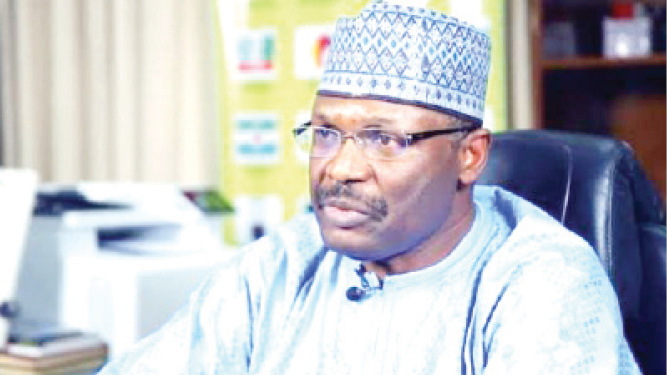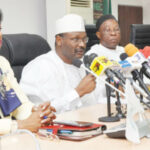Professor Mahmood Yakubu, chairman of INEC, has been consistent in asserting the independence of the commission to earn local and global respect for the integrity and the conduct of our elections. But in caving in to the pressure by the political parties last week to extend the deadline for the conduct of the party primaries by six days, he slipped. He has allowed the political parties to put their foot in the door of the commission.
The implications are grave and should be obvious to him and his commission. It is his duty to jealously guard the independence of the commission. If he accommodates the politicians out of sympathy for their fumbling, he jeopardises the integrity of the commission. The moral of the story of the washerman’s donkey ought not to be lost on the professor.
- Reps race: Buhari’s nephew, others, lose APC tickets as Doguwa, Betara win
- 2023: Nigeria won’t fail Africa – Buhari
Festus Okoye, INEC national commissioner and chairman of the commission’s information and voter education committee, said: “The commission has decided to allow the request of the political parties since the six-day period does not conflict with the next scheduled activity which is the submission of the list of nominated candidates or any other subsequent timelines which remain sacrosanct.”
Okoye made it sound like a harmless, routine request the commission could not deny the political parties. I am afraid it is not that simple or innocent. The political parties were fully aware of the timetable. They had time enough to put their houses in order to conduct free and fair party primaries at all levels. They failed to do so and are in this obvious mess because they could not resist the temptation to constantly change the rules in compliance with certain exigencies. They cheat and marginalise aspirants in favour of other aspirants. It is all mago-mago and wuru-wuru.
The commission repeatedly warned them that it would insist on their adherence to the deadline. It should have been firm on that stand. Our politicians are an undisciplined lot with a penchant for bending the rules, disobeying the rules and desecrating the rules. I fear that their success this time will encourage them to make further requests to the commission to change its mind now and in the future to alter the election timetable to suit their purposes.
Politicians deploy pressure and blackmail as veritable weapons in unholy attempts to gain comparative political advantages. Yakubu, I presume, is well aware of this. I can think of nothing more pleasing to the politicians than their assumed right to dictate to the commission or to bend it to their will at every stage in the conduct of our elections. This, they must not be allowed to do. The erosion of the independence of the commission is deleterious to the health of our democracy, such as it is. Once the commission has decided on the timetable for our national elections, it must find the courage to stick to it. It must ignore the howls of protests by the politicians.
Professor Attahiru Jega, immediate past chairman of INEC, underlined this point at a colloquium on the topic, “Emerging issues that will shape the 2023 general elections in Nigeria,” in Abuja last week. He commended the commission for withstanding the pressures from the political parties to change the timetable for the elections. He said: “Shifting the timetable is a recipe for electoral disaster because once you shift one timeframe, it affects virtually all the others.”
We cannot put this delicately. It is not the business of the commission to work to the convenience of the political parties. It is rather its business to regulate the conduct of party primaries and the conduct of elections at its own convenience and in accordance with extant laws guiding its work and protecting its independence and make the politicians and their parties comply.
We are at a fork in our long trek towards democracy in which the people, in law and fact, are the custodians of power. Our politicians have fouled up our democracy and given it a peculiar slant as a local re-invention of this universally beloved form of government. They have made money the sole determinant of who gets power and who is denied the chance to market himself to the electorate. What aspirants paid for the expression of interest forms for the presidential elections clearly showed this. Only the rich can pay these charges: APC, N100 million; PDP, N42 million.
Our national economy is in a parlous state. This high cost of seeking elective offices is unsustainable. It did not faze the aspirants at all levels. They have deep pockets. Money flowed into the coffers of the parties. The parties became richer but the country became morally bankrupt.
We spend more on the conduct of our elections with mixed results than any other developing country. The 2019 general elections cost the country N242 billion. The next general elections in 2023 will cost N305 billion. Good money but the problems that bedevil our elections will remain. The parties will rig, violence will attend the elections, various acts of electoral fraud and malpractices will be perpetrated and our return on this colossal investment will come to naught.
In its editorial of January 3, 2022, TheGuardian newspaper wondered about “What is responsible for the high cost of Nigeria’s elections? Does allocating more resources guarantee a fair and credible elections? And how can the country reduce the cost to a more affordable level?”
At the colloquium referred to earlier, Yakubu expressed concern about the dangerous influence of money on our national politics. He said “…the influence of money on politics…is becoming more present and the risk is that ours may soon become a plutocracy for the rich rather than a democracy for the people.”
To put it another way, Nigeria faces the clear and present danger of its politicians turning its democracy from a government of the people by the people for the people into a government of the rich by the rich for the rich. This was not what we bargained for in 1999. We should not allow our country to be led down that unwanted garden path. When the people are denied the right to participate in choosing their leaders in a participatory democracy, its democracy becomes a sham and a shame.
An election is a civic duty incumbent on the citizens. The people’s right to freely cast their votes for men and women of their choice, ought not to be abridged. But it is now abridged by money had has become hostage to money politics. Money influences the choices that people make; therefore, the choices are anything but free. Money makes it impossible for the people to participate in elections with a clear conscience. Our elections have been turned into a war. At every election, heads and limbs are broken and lives are lost.
Perhaps, we need to pause and ask our politicians: What do you want, democracy or plutocracy?


